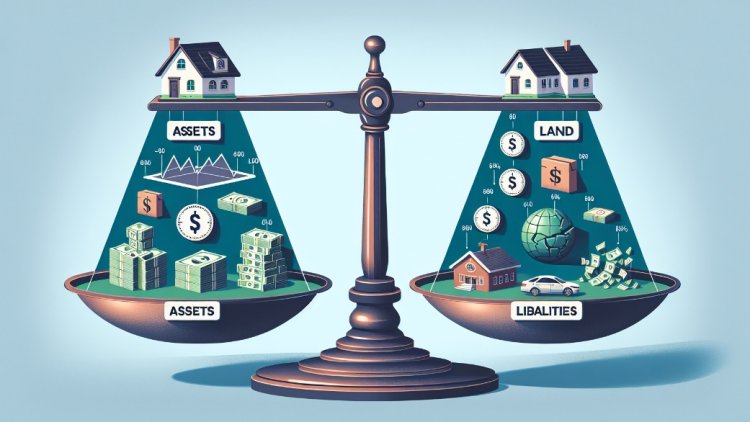Assets vs. Liabilities and How to Generate Assets
Unlock the secrets of financial freedom! Learn the difference between assets and liabilities, and discover powerful strategies to generate assets and build long-term wealth.

Assets vs. Liabilities and How to Generate Assets
Introduction
Knowing the difference between assets and liabilities is really important for doing well with money. In other words, assets are things that make you money, like toys you can sell. Liabilities are things that make you spend money, like cookies you have to buy. In this blog, we will talk about valuable things and things that are not valuable. We will learn about different types of valuable things and how to get more of them and less of the not-valuable things.
Defining assets and liabilities
Assets are things that we can use to make money, and they are valuable. It's important to know that things you have can make you money or become more valuable as time goes on. On the other hand, liabilities are things that take away your money and make you have less. A house is like a big building where people live. Some people think it's something valuable, but they might be wrong. But if you don't want to sell the house, it can actually be a problem because you have to keep paying for it every month and take care of it too.
Investments as Assets
Investments are like special things that people buy because they can make more money in the future. They are like toys that can grow and give you more toys! Things like stocks, shares, and bonds are like special toys that adults have. They are called assets because they can make adults more money. They can do this by giving grown-ups extra money called dividends or by being sold for more money than they were bought for, which is called capital gains.
The Car Dilemma
Some people argue about whether a car is something valuable that you own. Some people say that a car can be like a toy that you can sell later, but usually, cars become very valuable very quickly. So, this thing doesn't make a lot of money, so it's not very useful. Some cars, like old or special ones, can become more valuable as time goes on.
Tangible vs. intangible assets
Things can be put into two groups: things you can touch and things you can't touch. Tangible assets are things you can touch and play with, like land, buildings, toys, money, and things we have in a store. Some things are real and we can touch them, like toys or food. But there are also things that we can't touch, like ideas or feelings, but they are still important. Examples are things that we can show or talk about. Brands are special names or symbols that companies use to show that something belongs to them. Patents are special rights that people get when they invent something new. Copyrights are like special rules that protect things that people create, like books or songs.
Real assets vs. financial assets
Some things we own are real, like toys or houses, and some things are financial, like money or stocks. Real things have value because we can use them or play with them. Financial things have value because people think they are important and can affect how things work. Real assets are things that have value all on their own, like toys or snacks. Their value doesn't change, even if other things around them change. Stocks and bonds are like special toys that people can buy. Their value is decided by how much people are willing to trade them for. Knowing how much a company is worth can help you figure out if a stock is too expensive or a good deal.
Stocks: The Mother of All Assets
Stocks are like little pieces of a company that you can own. It's kind of like having a small part of a toy that belongs to you. When you buy stocks, it's like becoming a special friend of the company. If you have a lot of stocks, you might get to vote on important things. There are two main ways to make money with stocks, like when you own a piece of a company. One way is when the value of the stocks goes up and you can sell them for more money. The other way is when the company shares some of its profits with you, and you get some money called dividends.
Capital Gain
Capital gain means that when you sell something called a stock for more money than you bought it for, you make a profit. Sometimes, the prices of things you can buy in the store go up and down because some people want to buy them and some people want to sell them. If you think a toy will become very popular, buying it when it costs less can make you lots of money when you sell it for more later. Sometimes, the things we buy can become cheaper, which means we might not get as much money back as we spent.
Dividends
Dividends are like when you have a toy and you give a little piece of it to your friends to share. It's when a company makes money and gives a little bit of that money to the people who own parts of the company. They can be given every year, every three months, or every six months. Dividends are like a special treat that the company gives to its owners. The owners get some extra money regularly just because they own a part of the company.
Acquiring Stocks
To buy pieces of a company (Stocks/Shares), you can open a special account with a website or your bank. Both choices mean following rules and paying money to the government. Instead, you can buy something called real estate investment trusts (REITs). They let you invest in real estate without needing to know a lot or have a lot of money.
Real Estate as an Asset
Buying and selling houses can make you lots of money if you do it smartly. When someone buys a house that costs less than it should and then fixes it up to make it better, they can sell it for more money later or rent it out to people who want to live there. When you have a home that you use for yourself and don't plan to sell, it's like spending money instead of saving it. Investing in houses or buildings requires thinking about when to do it, where to do it, and how the economy is doing.
Knowledge as an Asset
Knowing things is like having a special treasure that can help you make lots of money. When you learn important things, you become very helpful and special. If you know a lot about something, like how to advertise on the Internet, you can help companies and make money. Furthermore, when you spend your resources on smart people who know a lot, it can bring you a lot of good things in return.
Conclusion
It's important to know the difference between things that help you get rich (assets) and things that make it harder (liabilities). Getting more things that you own and making sure you owe less is something we should try to do. If you put your money into special things like stocks, and houses, and learn new things, you can make more money and have a strong foundation for a happy future.



 admin
admin 










